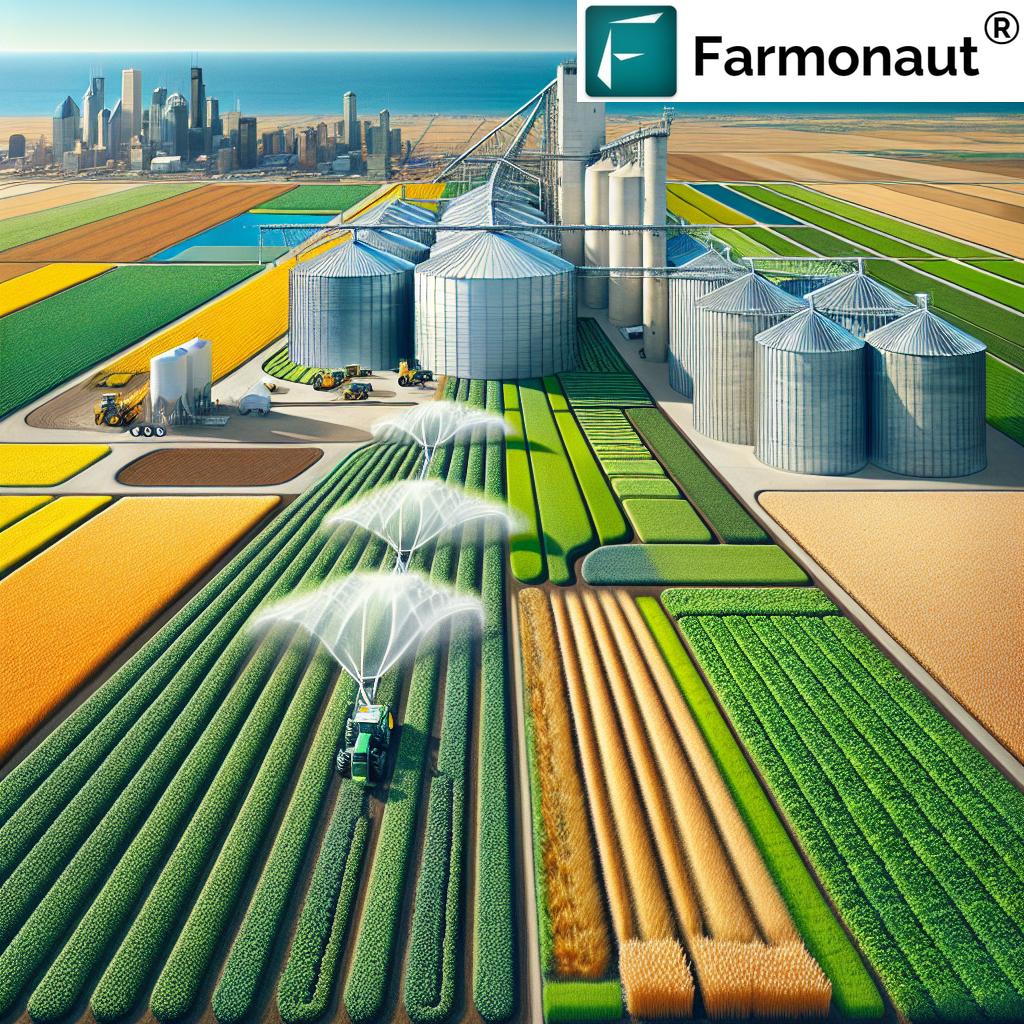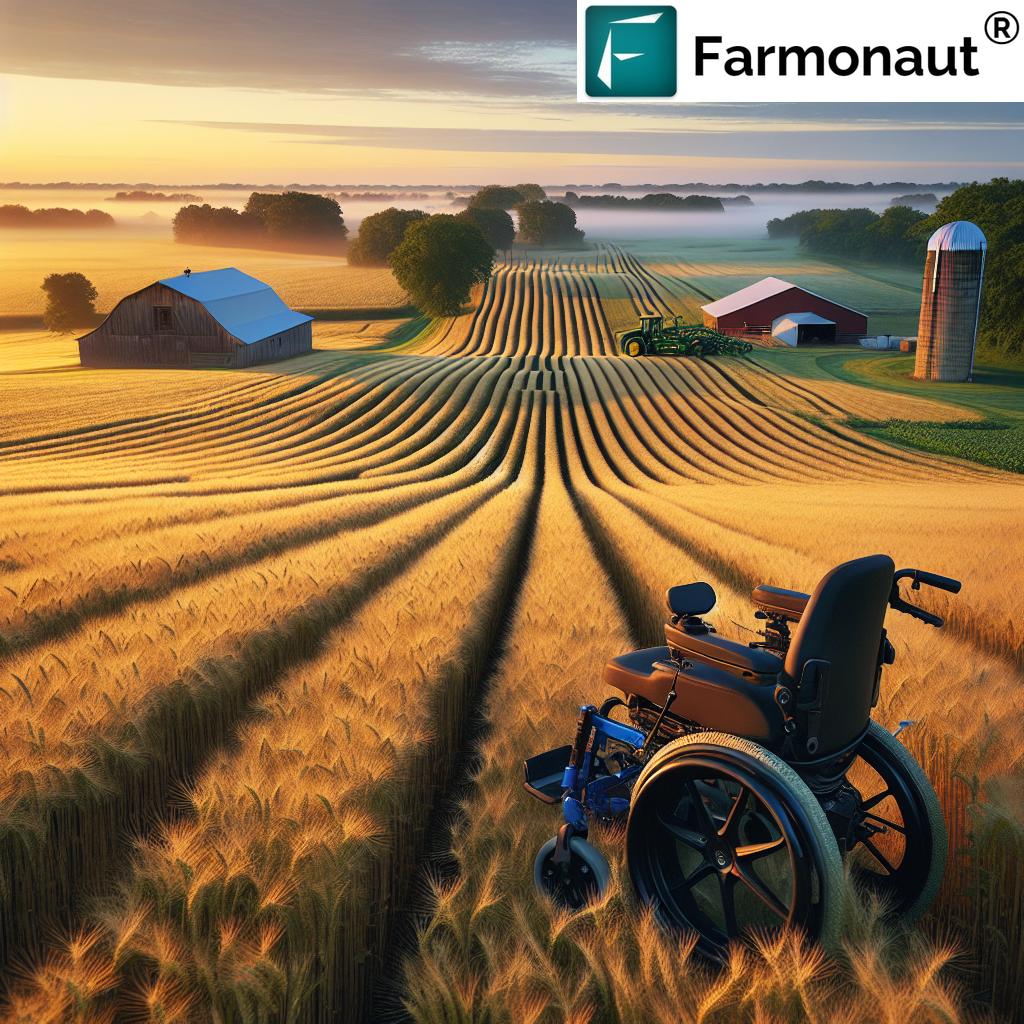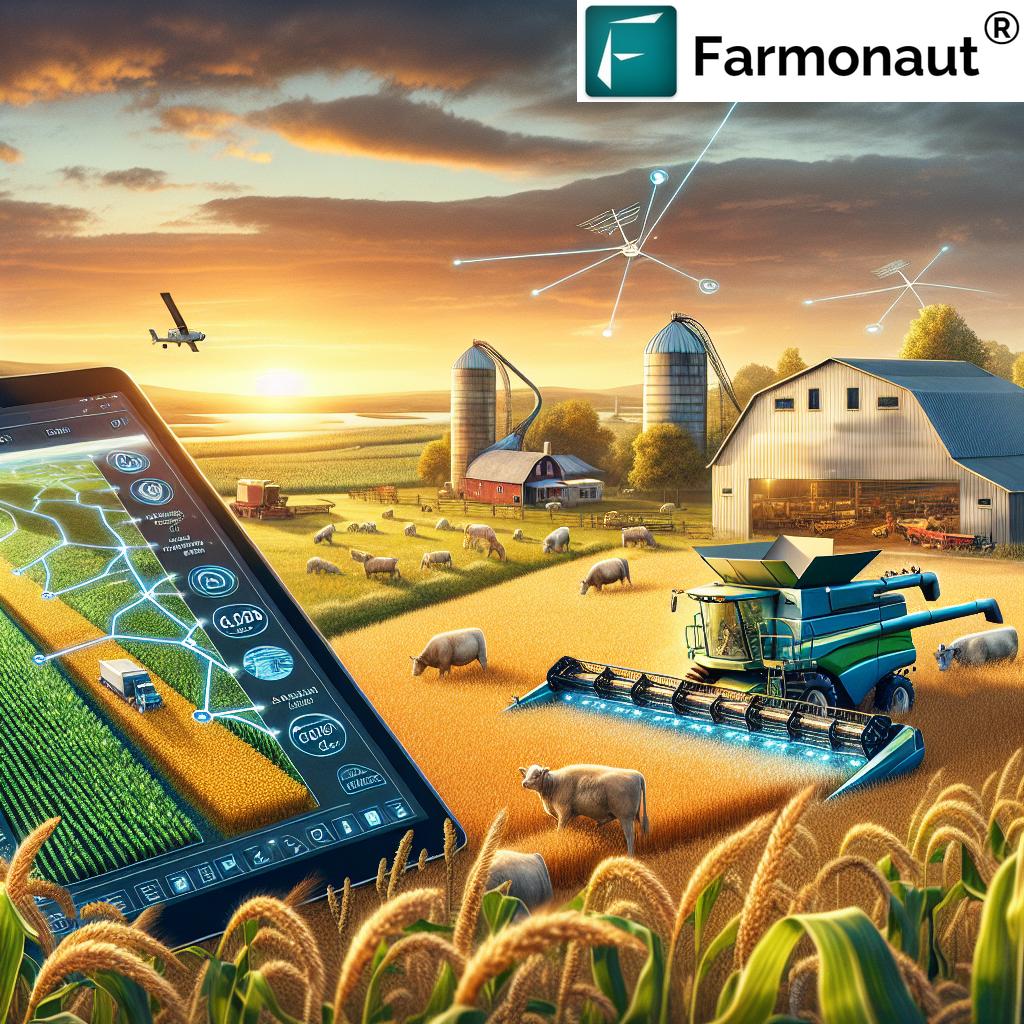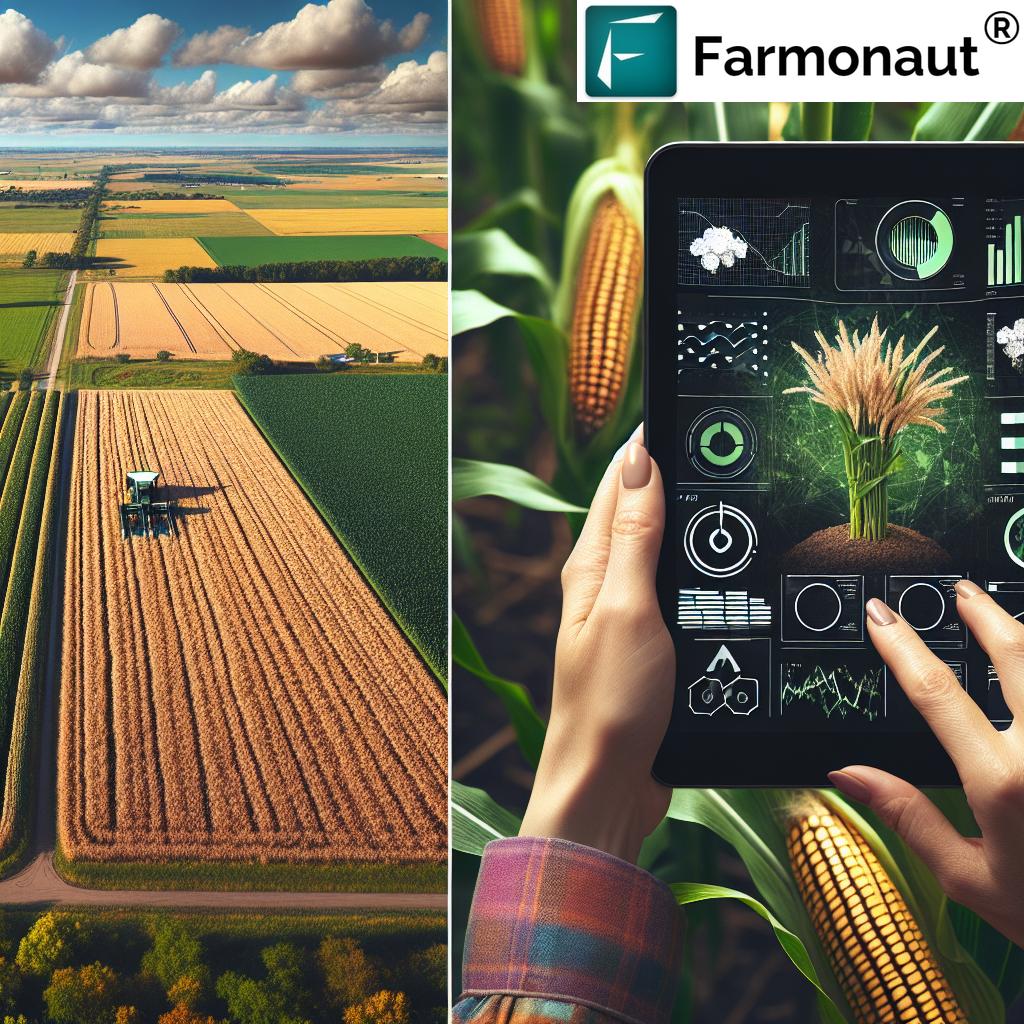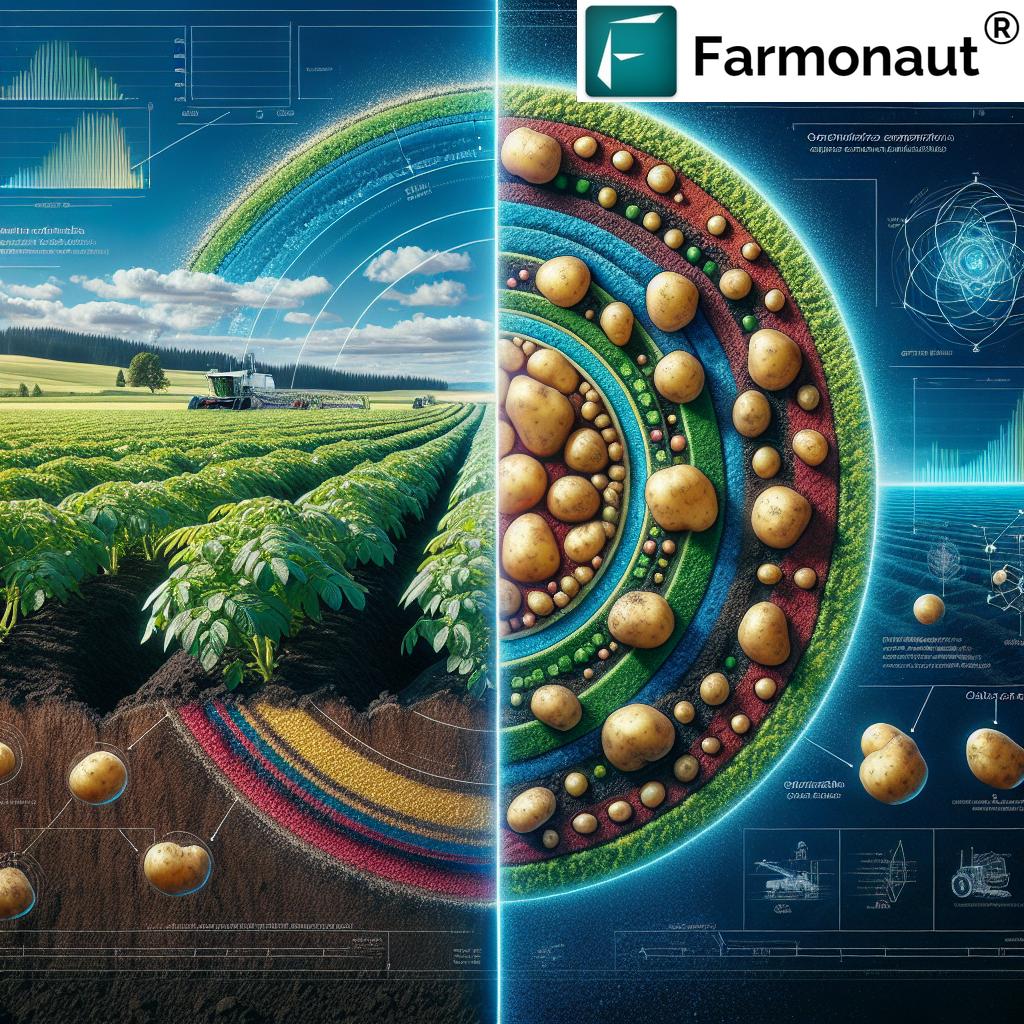Navigating Illinois Agriculture: Challenges, Innovations, and Optimism in Farming’s Future

“Illinois farmers have adapted to a 30% increase in input costs over the last decade, showcasing resilience in agriculture.”
As we delve into the intricate world of Illinois agriculture, we find ourselves at a crossroads of challenge and opportunity. The Prairie State, known for its vast expanses of fertile farmland, has long been a cornerstone of American agriculture. Today, we’re witnessing a pivotal moment in the state’s farming history, marked by the departure of a long-standing farm leader and the dawn of a new era in agricultural innovation and resilience.
In this comprehensive exploration, we’ll navigate the complex landscape of Illinois agriculture, examining the challenges faced by farmers, the innovative solutions emerging from the fields, and the unwavering optimism that characterizes the future of farming in this vital agricultural hub.
The Changing Face of Illinois Agriculture
Illinois has long been synonymous with bountiful harvests of corn and soybeans, but the agricultural landscape is evolving rapidly. As we bid farewell to a decade of leadership under Richard Guebert Jr., we reflect on the transformations that have shaped the state’s farming sector and look ahead to the challenges and opportunities that lie on the horizon.
- Rising input costs and fluctuating commodity prices
- Advancements in farming technology and machinery
- Shifting weather patterns and climate considerations
- Evolving market demands and global trade dynamics
These factors have collectively reshaped the way Illinois farmers approach their craft, forcing adaptations and inspiring innovations that are setting new standards for agricultural excellence.
Facing the Challenges Head-On
The challenges facing Illinois agriculture are multifaceted and complex. From economic pressures to environmental concerns, farmers are navigating a landscape that demands resilience, adaptability, and forward-thinking strategies.
Rising Input Costs and Market Volatility
One of the most pressing Illinois agriculture challenges is the steady increase in farm input costs. Seeds, fertilizers, fuel, and equipment have all seen significant price hikes over the past decade, putting pressure on farm budgets and profitability. Simultaneously, commodity prices have remained volatile, creating a squeeze on farm incomes that requires careful financial management and strategic planning.
To combat these economic challenges, many Illinois farmers are turning to precision agriculture techniques and data-driven decision-making. Tools like Farmonaut’s satellite-based crop monitoring system can help farmers optimize their resource use, potentially reducing input costs while maximizing yields. 
Weather Uncertainties and Climate Adaptation
Unpredictable weather patterns and changing climate conditions pose significant challenges to Illinois agriculture. Farmers must contend with the potential for increased flooding, drought, and extreme temperature fluctuations that can impact crop yields and quality. Adapting to these changes requires a combination of traditional wisdom and cutting-edge technology.
Innovative planting strategies for corn and soybeans are being developed to mitigate weather-related risks. These include:
- Adjusting planting dates based on long-term weather forecasts
- Implementing cover crops to improve soil health and moisture retention
- Utilizing drought-resistant crop varieties
- Investing in efficient irrigation systems
Farmonaut’s AI-driven advisory system, Jeevn AI, provides farmers with real-time insights and weather forecasts, enabling them to make informed decisions about crop management in the face of changing weather patterns.
Innovations Driving Illinois Agriculture Forward
Despite the challenges, Illinois agriculture is experiencing a renaissance of innovation, with farmers and agribusinesses embracing new technologies and practices to enhance productivity and sustainability.
Efficient Farming Machinery and Precision Agriculture
The integration of efficient farming machinery has revolutionized planting and harvesting processes in Illinois. Modern equipment, equipped with GPS guidance systems and precision controls, allows farmers to plant with unprecedented accuracy and efficiency. This technology not only improves yield potential but also reduces waste and environmental impact.
“Efficient farming machinery has improved corn and soybean planting speeds by up to 40% in Illinois fields.”
Precision agriculture technologies, such as those offered by Farmonaut, take this efficiency to the next level. By leveraging satellite imagery and AI analysis, farmers can:
- Monitor crop health in real-time
- Identify areas of stress or disease before they become visible to the naked eye
- Optimize irrigation and fertilizer application
- Make data-driven decisions to improve overall farm management
Farmonaut’s API allows for seamless integration of these precision agriculture tools into existing farm management systems, further enhancing the potential for optimization and efficiency gains.
Sustainable Farming Practices
Sustainable farming practices are becoming increasingly important in Illinois as farmers seek to balance productivity with environmental stewardship. These practices not only benefit the ecosystem but can also improve long-term soil health and farm profitability.
Key sustainable practices gaining traction include:
- No-till and reduced tillage farming
- Crop rotation and diversification
- Integrated pest management
- Precision nutrient management
- Water conservation techniques
Farmonaut’s platform supports these sustainable practices by providing farmers with detailed insights into their land and crop health, enabling them to make more environmentally conscious decisions without sacrificing productivity.
Navigating Economic Trends in Agriculture
Understanding and adapting to agricultural economic trends is crucial for the success of Illinois agriculture. Farmers must navigate a complex web of financial considerations, from interest rates to global market dynamics.
Interest Rates and Farm Credit
Navigating interest rates in agriculture has become increasingly important as farmers rely on credit to finance operations and investments. The Federal Reserve’s monetary policy decisions have a direct impact on farm loan rates, affecting everything from equipment purchases to land acquisitions.
To help farmers manage these financial challenges, initiatives like the Illinois Farm Bureau’s financial education programs provide resources and guidance on:
- Understanding farm credit options
- Managing debt and cash flow
- Developing risk management strategies
- Planning for long-term financial stability
Additionally, technologies like Farmonaut’s satellite-based verification system can help financial institutions assess crop health and potential yields, potentially improving access to credit for farmers with proven track records of efficient land management.
Global Markets and Local Impacts
The global nature of agricultural markets means that events halfway around the world can have significant impacts on Illinois agriculture. Trade policies, international conflicts, and shifts in global demand all play a role in shaping commodity prices and export opportunities for Illinois farmers.
To stay competitive in this global marketplace, Illinois farmers are:
- Diversifying crop portfolios to reduce risk
- Exploring niche markets and value-added products
- Leveraging technology to improve product quality and traceability
- Participating in cooperative marketing efforts to access larger markets
Farmonaut’s blockchain-based traceability solutions can play a crucial role in helping Illinois farmers meet the demands of global markets, particularly for products where origin and quality assurance are paramount.
The Role of Agricultural Leadership
Agricultural leadership in Illinois has been pivotal in guiding the sector through times of change and challenge. As we witness a transition in leadership, it’s important to recognize the ongoing efforts to support and advocate for the state’s farming community.
Illinois Farm Bureau Initiatives
The Illinois Farm Bureau continues to be a driving force in shaping agricultural policy and providing support to farmers across the state. Key initiatives include:
- Advocacy for farmer-friendly policies at state and federal levels
- Educational programs on emerging agricultural technologies and practices
- Networking opportunities for farmers to share knowledge and resources
- Support for young farmers entering the industry
These initiatives are crucial in ensuring that Illinois remains at the forefront of agricultural innovation and productivity.
Empowering the Next Generation of Farmers
As the average age of farmers continues to rise, there’s a growing focus on attracting and supporting young people in agriculture. Programs aimed at educating and empowering the next generation of farmers are essential for the long-term sustainability of Illinois agriculture.
Efforts in this area include:
- Mentorship programs pairing experienced farmers with newcomers
- Agricultural education in schools and universities
- Financial assistance and land access programs for beginning farmers
- Technology training to help young farmers leverage new agricultural tools
Farmonaut’s user-friendly platform and mobile apps are designed to appeal to tech-savvy young farmers, making it easier for them to adopt precision agriculture practices from the start of their careers. 

The Future of Family-Run Farm Operations
Family-run farm operations have been the backbone of Illinois agriculture for generations. As we look to the future, these farms face both challenges and opportunities in maintaining their legacy while adapting to changing times.
Balancing Tradition and Innovation
Many family farms are finding success by blending traditional farming wisdom with modern agricultural technologies. This approach allows them to maintain the personal touch and deep connection to the land that characterizes family farming while leveraging innovations to improve efficiency and profitability.
Strategies for success include:
- Adopting precision agriculture technologies to optimize resource use
- Diversifying income streams through value-added products or agritourism
- Implementing sustainable practices to ensure long-term viability
- Collaborating with other family farms to share resources and knowledge
Farmonaut’s scalable solutions are particularly well-suited to family farms, offering affordable access to advanced agricultural technologies that can significantly enhance farm management and productivity.
Succession Planning and Farm Transitions
One of the most significant challenges facing family farms is the transition of ownership and management to the next generation. Successful succession planning is crucial for preserving the legacy of family farms and ensuring their continued contribution to Illinois agriculture.
Key aspects of effective farm transition planning include:
- Open communication between generations about goals and expectations
- Financial planning to ensure the viability of the farm through the transition
- Legal considerations, including estate planning and business structure
- Gradual transfer of responsibilities to allow for mentoring and skill development
By addressing these aspects thoughtfully, family farms can position themselves for continued success in the evolving agricultural landscape of Illinois.
Conservation and Environmental Stewardship
Conservation efforts play a crucial role in the long-term sustainability of Illinois agriculture. As stewards of the land, farmers are increasingly adopting practices that protect natural resources while maintaining productivity.
Soil Health and Water Management
Preserving soil health and managing water resources are top priorities for Illinois farmers. Practices aimed at improving these vital aspects of agriculture include:
- Cover cropping to prevent erosion and improve soil structure
- Precision irrigation to conserve water and prevent runoff
- Buffer strips along waterways to reduce nutrient pollution
- Reduced tillage practices to maintain soil organic matter
Farmonaut’s satellite monitoring capabilities can assist farmers in identifying areas where conservation practices are most needed, allowing for targeted interventions that maximize environmental benefits while minimizing costs.
Biodiversity and Habitat Preservation
Maintaining biodiversity and preserving natural habitats are increasingly recognized as important aspects of sustainable agriculture. Illinois farmers are finding ways to integrate conservation into their farming practices, such as:
- Creating pollinator habitats to support bee populations
- Preserving wetlands and woodlands on farm properties
- Participating in conservation easement programs
- Implementing integrated pest management to reduce chemical use
These efforts not only benefit the environment but can also enhance farm productivity by supporting beneficial insects and improving overall ecosystem health.
Embracing the Rural Lifestyle
The rural lifestyle associated with farming in Illinois remains an integral part of the state’s cultural fabric. Despite the challenges faced by the agricultural sector, many continue to find fulfillment and purpose in rural living.
Community and Connection
Rural communities in Illinois are known for their strong sense of community and connection. Farmers and their families often play central roles in local organizations, schools, and civic groups. This tight-knit social fabric provides support and resilience in the face of agricultural challenges.
Community-building activities in rural Illinois include:
- County fairs and agricultural exhibitions
- Farm-to-table events showcasing local produce
- Rural development initiatives to support small businesses
- Youth programs like 4-H and FFA that foster agricultural interest
Balancing Tradition and Progress
As rural Illinois evolves, there’s a delicate balance to be struck between preserving traditional ways of life and embracing progress. Many rural communities are finding innovative ways to maintain their character while adapting to changing times:
- Expanding broadband access to support remote work and education
- Developing agritourism opportunities to diversify farm income
- Promoting local food systems and farmers’ markets
- Integrating renewable energy projects into agricultural operations
These efforts help ensure that rural Illinois remains a vibrant and attractive place to live and work, supporting the continued strength of the state’s agricultural sector.
Looking Ahead: The Future of Illinois Agriculture
As we consider the future of Illinois agriculture, it’s clear that the sector is poised for continued evolution and innovation. The challenges faced by farmers are significant, but so too are the opportunities for growth and improvement.
Emerging Technologies and Practices
The integration of new technologies will play a crucial role in shaping the future of farming in Illinois. Some of the most promising developments include:
- Artificial intelligence and machine learning for predictive agriculture
- Robotics and automation for labor-intensive tasks
- Gene editing for crop resilience and nutritional enhancement
- Advanced sensor technologies for real-time monitoring of crops and livestock
Farmonaut’s commitment to innovation aligns closely with these trends, offering farmers access to cutting-edge satellite and AI technologies that can dramatically improve farm management and decision-making.
Policy and Market Trends
The future of Illinois agriculture will also be shaped by evolving policies and market trends. Key areas to watch include:
- Climate change policies and their impact on farming practices
- International trade agreements and their effects on commodity markets
- Consumer preferences for sustainable and locally sourced foods
- Government support for agricultural research and development
Staying informed and adaptable in the face of these changes will be crucial for Illinois farmers looking to thrive in the coming years.
Conclusion: Optimism in the Face of Change
As we navigate the complex landscape of Illinois agriculture, it’s clear that the sector faces both significant challenges and exciting opportunities. The resilience and adaptability demonstrated by Illinois farmers in the face of rising input costs, market volatility, and environmental concerns are testament to the enduring strength of the state’s agricultural community.
The integration of innovative technologies, such as those offered by Farmonaut, alongside sustainable farming practices and strong agricultural leadership, positions Illinois agriculture for a future of continued growth and success. By embracing precision agriculture, sustainable practices, and data-driven decision-making, Illinois farmers are not just adapting to change – they’re leading the way in shaping the future of farming.
As we bid farewell to a decade of leadership and welcome new voices and perspectives, the spirit of innovation and community that characterizes Illinois agriculture remains strong. With a commitment to balancing tradition and progress, supporting family farms, and nurturing the next generation of agricultural leaders, Illinois is well-positioned to remain a cornerstone of American agriculture for generations to come.
The challenges are real, but so too is the optimism and determination of Illinois farmers. As they continue to embrace new technologies, sustainable practices, and collaborative approaches to problem-solving, the future of Illinois agriculture looks bright indeed.
FAQs
- Q: What are the main crops grown in Illinois?
A: The main crops grown in Illinois are corn and soybeans, with significant production of wheat, oats, and hay as well. - Q: How is technology changing farming in Illinois?
A: Technology is revolutionizing Illinois agriculture through precision farming techniques, AI-driven crop management, satellite monitoring, and advanced machinery that improves efficiency and yield. - Q: What are the biggest challenges facing Illinois farmers today?
A: Major challenges include rising input costs, market volatility, unpredictable weather patterns, and the need to adopt sustainable practices while maintaining profitability. - Q: How are Illinois farmers addressing environmental concerns?
A: Illinois farmers are implementing conservation tillage, cover cropping, precision nutrient management, and other sustainable practices to protect soil health and water quality. - Q: What role do family farms play in Illinois agriculture?
A: Family farms remain the backbone of Illinois agriculture, balancing traditional farming wisdom with modern technologies to maintain their legacy and adapt to changing times.
Illinois Agriculture Trends and Challenges
| Agricultural Aspect | Past Decade | Future Outlook |
|---|---|---|
| Input Costs | Steady increase, up 30% | Continued rise, focus on efficiency |
| Commodity Prices | Volatile, overall downward trend | Uncertain, influenced by global markets |
| Farming Technology | Traditional machinery, emerging precision ag | AI-driven precision agriculture, robotics |
| Sustainable Practices | Growing adoption of conservation tillage | Widespread implementation of integrated sustainable systems |
| Economic Factors | Challenging profitability, increased debt | Focus on diversification, value-added products |
Farmonaut Subscriptions
